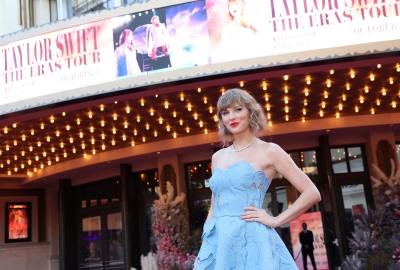LOS ANGELES, Nov 8 — Taylor Swift seems to have the world at her feet thanks to her Eras Tour and its accompanying concert film. While economists may revel in what they call the “Taylor Swift effect,” record companies are worried that other artists will follow the singer’s example by re-recording their previous releases to gain independence.
The hard work is paying off for Taylor Swift. The North American leg of her world tour alone is expected to bring in some US$2.2 billion, according to a QuestionPro study reported by CNN. And that’s just an estimate based on primary ticket sales for North America. What’s more, the feature film dedicated to this event, The Eras Tour Film, screening since October 13 in thousands of theaters in some 100 countries, has already generated more than US$200 million in revenue, according to CNBC. By the end of the star’s 146-date world tour in November 2024, it could become one of the most successful concert movies in history.
But Taylor Swift’s influence goes beyond the financial. She has become an expert in the art of creating a buzz around her music, be it recent or older releases. Indeed, in 2019, the singer announced her intention to re-record her first six albums to gain artistic independence. She took this decision after the boss of her former label, Scott Borchetta, sold her masters (original recordings) to Scooter Braun, an American producer and manager. Braun in turn sold the rights to the recordings to an investment company, without Taylor Swift having any say in the matter.
A source of concern for major record labels
Advertisement
To date, Taylor Swift has re-recorded four of her six albums: Fearless (Taylor’s Version), Red (Taylor’s Version), Speak Now (Taylor’s Version) and 1989 (Taylor’s Version). These new versions were a major commercial success. Red (Taylor’s Version) even broke Spotify’s record for the most-listened-to album by a female artist in a single day, following its release on November 12, 2021, while the new recording of 1989 is selling even better than the original, according to Luminate figures reported by the Financial Times.
While this success is a great form of revenge for the singer, it is also making record labels fear that other artists will return to the studio to reclaim the rights to their creations. Universal Music Group, Sony Music Entertainment and Warner Music Group have recently been reviewing the contracts of their new signings, according to information from Billboard. Some are reportedly even requiring them to wait 10, 15 or even 30 years to re-record their songs after leaving the label.
These are unprecedented timescales. Indeed, record companies traditionally required their artists to wait five to seven years after the release of their album, or two years after the end of their contract, to create new versions of their previous releases. “Now, because of all this Taylor Swift stuff, we have an even new negotiation. It’s awful. We’re seeing a lot of ‘perpetuity,’” music attorney Dina LaPolt told Billboard.
Advertisement
A strategy that paid off for Taylor Swift
A spokesperson for Universal Music Group denied that the change in policy had anything to do with the American singer. The Wall Street Journal previously reported in 2021 that the label had revised its recording contracts in an attempt to protect itself in case other artists wanted to re-record their discography at a later date.
This strategy can prove highly lucrative for those who choose to pursue it. A large part of Taylor Swift’s fortune, which Bloomberg estimates at over US$1 billion, hails from her music catalogue. Her post-2019 releases have reportedly earned her some US$400 million, showing that her gamble to record new versions of six early albums paid off.
Still, few artists are following her example, however inspiring and lucrative it may seem. In 2018, American singer JoJo re-recorded her first two albums, JoJo and The High Road, to draw a line under a long-running dispute with one of her former labels, Blackground Records. More recently, alternative rock band Switchfoot also returned to the studio to create a new version of their fourth album, The Beautiful Letdown.
But, unlike Taylor Swift and JoJo, this record was not an attempt to regain control of the band’s music, but rather a gift to their fans: “What if we made the album, but this time, instead of for [the Sony exec], let’s record it for everyone who’s supported us the last 23 years — for everyone who’s sung along with these songs?” one of the group’s members, Jon Foreman, told Billboard in September. — ETX Studio







